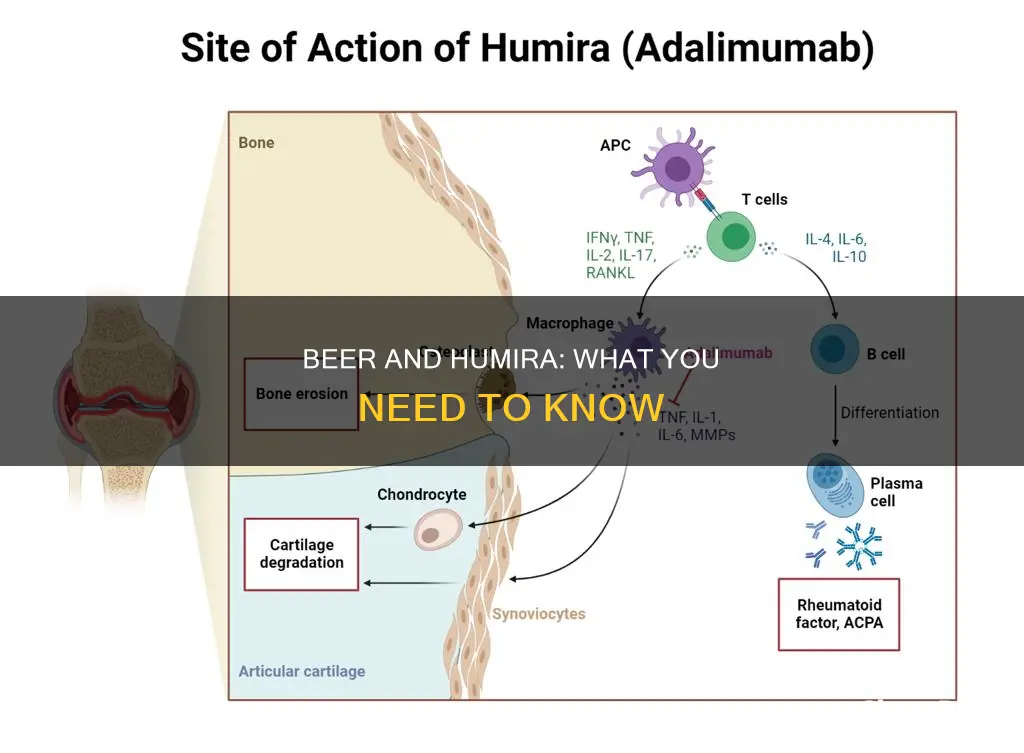
Humira, also known as adalimumab, is a prescription medication used to treat certain autoimmune disorders. It is typically used to treat inflammatory conditions such as rheumatoid arthritis, Crohn's disease, and ulcerative colitis. While there is no specific research on the interaction between Humira and alcohol, many doctors consider it safe to consume alcohol in moderation while taking Humira. However, it is important to note that the combination of Humira and alcohol could theoretically increase the risk of liver damage, especially if taken in large amounts or over a prolonged period. Therefore, it is recommended to consult a doctor about the risks and to drink in moderation if approved by a healthcare provider.
| Characteristics | Values |
|---|---|
| Can you drink beer while on Humira? | Drinking alcohol in moderation is likely to be safe when taking Humira. However, there is little research into how alcohol and Humira interact, so the risks are not yet fully known. |
| Humira's impact on the body | Humira can cause liver problems, resulting in symptoms like yellowing of the skin or eyes (jaundice), dark brown urine, or severe nausea and vomiting. |
| Alcohol's impact on the body | Alcohol is metabolized in the liver. Excessive alcohol consumption is well-known to contribute to liver issues, resulting in fatty liver disease or even cirrhosis. |
| Potential risks of combining Humira and alcohol | Combining Humira with alcohol may amplify the risk of liver damage, especially if taken in large amounts or over a prolonged period. |
| Precautions | Consult your healthcare provider, limit alcohol intake, stay hydrated, monitor for any side effects or changes in your body, avoid binge drinking, keep updated on guidelines regarding Humira and alcohol, and always trust your instincts. |
What You'll Learn
- Humira and alcohol may both strain the liver
- Humira suppresses the immune system; alcohol may further weaken it
- Humira may affect blood clotting; alcohol may interfere with blood cell production
- Humira may cause gastrointestinal issues; alcohol can irritate the stomach lining
- Consult a doctor about drinking alcohol while on Humira

Humira and alcohol may both strain the liver
Humira (adalimumab) is a prescription medication used to treat inflammatory conditions, including rheumatoid arthritis, psoriatic arthritis, Crohn's disease, ulcerative colitis, and hidradenitis suppurativa. It is a biologic medication, which means it is derived from living organisms. Humira is part of a class of medications known as tumor necrosis factor (TNF) blockers, which work by blocking the action of TNF, a substance in the body that causes inflammation.
While there is no specific research on the interaction between Humira and alcohol, it is important to consider the potential risks of combining them. Both Humira and alcohol can strain the liver, and excessive alcohol consumption is well-known to contribute to liver issues, such as fatty liver disease or cirrhosis. Humira is also associated with a rare risk of liver injury, and doctors believe that drinking alcohol could increase this risk.
The liver breaks down alcohol waste products and also metabolizes many medications. When an individual consumes alcohol and takes certain medications, it places extra demands on the liver, potentially causing liver damage. Humira is broken down differently in the body, so it is less likely to cause damage when combined with alcohol compared to other medications. However, the combination of Humira and alcohol may still increase the risk of liver damage, especially if alcohol is consumed in large amounts or over a prolonged period.
It is important to note that the potential risks of combining Humira and alcohol are not fully understood due to the lack of research in this area. Therefore, it is recommended to consult a doctor or healthcare provider to understand the individual risks and to determine safe consumption levels.
Breastfeeding and Alcohol: Is Red Beer Safe?
You may want to see also

Humira suppresses the immune system; alcohol may further weaken it
Humira (adalimumab) is a prescription medication used to treat inflammatory conditions, including rheumatoid arthritis, psoriatic arthritis, Crohn's disease, ulcerative colitis, and hidradenitis suppurativa. It is a biologic medication, which means it is derived from living organisms. Specifically, it is a type of tumour necrosis factor (TNF) inhibitor, which works by blocking the action of TNF, a substance in the body that causes inflammation.
Humira is an immunosuppressant, meaning it suppresses the immune system to help manage autoimmune conditions. While this is beneficial for treating autoimmune conditions, it also means that the body can become more susceptible to infections. This is an important consideration when thinking about drinking alcohol while on Humira, as chronic alcohol use can also weaken the immune system. The combination of Humira and alcohol may further compromise the immune system, potentially increasing the risk of infections.
In addition to increasing the risk of infections, drinking alcohol while on Humira may have other negative effects. Humira can cause liver problems, and alcohol is also known to contribute to liver issues. Therefore, combining the two may increase the risk of liver damage, especially if alcohol is consumed in large amounts or over a prolonged period.
It is important to note that there is limited research on the interaction between Humira and alcohol. While Humira's patient information sheets state that there are no particular risks associated with alcohol when taking Humira, the lack of research means that the specific risks are not yet fully understood. As such, it is always best to speak to your doctor about alcohol use with any medication, including Humira. They can advise on individual consumption levels based on your specific situation.
Beer and Lamotrigine: What You Need to Know
You may want to see also

Humira may affect blood clotting; alcohol may interfere with blood cell production
While there is no specific research on the interaction between Humira and alcohol, there are some theoretical risks to be aware of. Humira is known to affect blood clotting and, in rare cases, may cause blood disorders. Alcohol, on the other hand, can interfere with the production and function of red and white blood cells and platelets. Therefore, combining alcohol with Humira may heighten the risk of blood-related complications.
Humira is a prescription medication used to treat inflammatory conditions related to autoimmune disorders. It works by suppressing the immune response and blocking the action of TNF (Tumor Necrosis Factor), a substance in the body that causes inflammation. While Humira is often effective in managing these conditions, it is important to be aware of its potential side effects and interactions with other substances, such as alcohol.
One of the possible side effects of Humira is liver injury, which is rare but can occur within a few months of starting the medication. Although the exact mechanism is not known, doctors believe that Humira's impact on the immune system may contribute to liver inflammation. As the liver breaks down alcohol, drinking alcohol while taking Humira may increase the risk of liver-related side effects.
Chronic alcohol use can also weaken the immune system, making it harder for the body to fight off infections. This, combined with Humira's immunosuppressant effects, may further compromise the immune system and increase the risk of infections. Therefore, it is important for individuals taking Humira to be cautious about consuming alcohol, especially if they have a weakened immune system or are prone to infections.
It is worth noting that the decision to drink alcohol while taking Humira should be made in consultation with a healthcare provider. They can assess individual risk factors, including medical conditions, medications, and liver function, to provide personalized guidance. Additionally, it is generally recommended to drink in moderation, as excessive alcohol consumption can have harmful effects on the body, especially the liver.
Beer and Bowel Movements: Constipation Concerns?
You may want to see also

Humira may cause gastrointestinal issues; alcohol can irritate the stomach lining
Drinking alcohol while on Humira may not be a good idea, especially if you are prone to gastrointestinal issues. Humira is a prescription medication used to treat certain autoimmune disorders. It is used to treat certain kinds of arthritis, ankylosing spondylitis, Crohn's disease, plaque psoriasis, ulcerative colitis, and hidradenitis suppurativa. It is a biologic medication that doctors prescribe to treat inflammatory conditions.
Humira can cause gastrointestinal issues such as nausea and stomach pain. Alcohol, on the other hand, can irritate the stomach lining, leading to gastritis, acid reflux, or other gastrointestinal symptoms. Consuming alcohol while on Humira could amplify these gastrointestinal issues and other related symptoms.
In addition, both Humira and alcohol can strain the liver. Humira can cause liver problems, resulting in symptoms like yellowing of the skin or eyes (jaundice), dark brown urine, or severe nausea and vomiting. Alcohol is metabolized in the liver, and excessive alcohol consumption is well-known to contribute to liver issues, resulting in fatty liver disease or even cirrhosis. Therefore, drinking alcohol while on Humira may amplify the risk of liver damage, especially if consumed in large amounts or over a prolonged period.
If you are considering drinking alcohol while on Humira, it is important to consult your healthcare provider first. They can help you understand the risks and advise if and how much alcohol is safe for you. It is also important to monitor liver function tests while on the medication to ensure everything is functioning properly.
Beer and Epidural Injections: Safe Same-Day Consumption?
You may want to see also

Consult a doctor about drinking alcohol while on Humira
It is important to consult a doctor about drinking alcohol while on Humira (adalimumab). While Humira's patient information sheets state that there are no particular risks associated with alcohol consumption when taking Humira, there is little research on how alcohol and Humira interact. Therefore, it is always best to consult a doctor about combining the two.
Humira is a prescription medication used to relieve the symptoms of certain autoimmune disorders, such as rheumatoid arthritis, Crohn's disease, and plaque psoriasis. It is a biologic medication, derived from living organisms, and works by blocking the action of TNF (Tumor Necrosis Factor), a substance in the body that causes inflammation.
While drinking alcohol in moderation is likely safe for most people taking Humira, specific studies from the manufacturer are not available. It is important to note that the lack of studies does not mean that combining Humira and alcohol is safe. There is a theoretical risk of increased liver damage when the two are combined, as both substances are processed by the liver. Chronic alcohol use can lead to inflammation and liver problems, which are the conditions that Humira aims to control.
Additionally, people taking Humira may also be taking other medications, such as methotrexate, NSAIDs, or corticosteroids, which can interact with alcohol and lead to liver damage. It is crucial to consult a doctor about all the medications being taken, as they can evaluate and determine the best course of action.
When consulting a doctor about drinking alcohol while on Humira, it is important to be open and honest about alcohol consumption habits and any other medications being taken. It is also recommended to monitor liver function regularly and stay hydrated if consuming alcohol.
Drinking Beer on Keflex: What You Need to Know
You may want to see also
Frequently asked questions
There is no specific research on the interaction between Humira and alcohol, but many doctors consider it safe to drink in moderation. However, it is important to consult your doctor as there may be a risk of liver damage and other side effects.
Both alcohol and Humira can strain the liver, so combining the two may increase the risk of liver damage. Humira can also cause immune system suppression, blood-related complications, and gastrointestinal issues, all of which can be negatively impacted by alcohol consumption.
Consult your healthcare provider, limit your alcohol intake, stay hydrated, and monitor for any side effects or changes in your body. Avoid binge drinking and keep updated on guidelines regarding Humira and alcohol.







